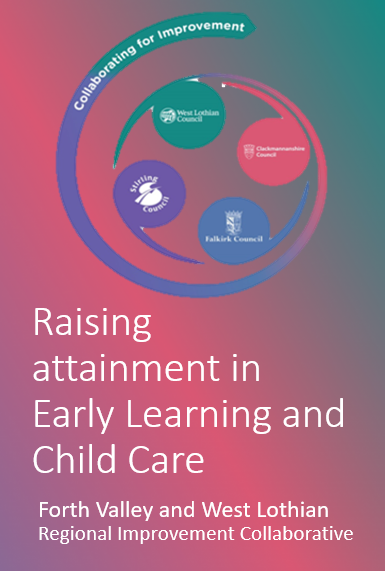 Why is this being prioritised?
Why is this being prioritised?
Each local authority is undertaking work to improve practitioner professionalism and to raise standards across Early Learning and Childcare settings. By working across the Collaborative, combining existing resources and expertise will support a more consistent approach to the delivery of professional learning and development, and to sharing practice. Practitioners have asked for support in this area to improve the quality of delivery of ELCC.
Overarching Aim
By the end of 2020, 100 % of children aged 2-3 years old will experience good or very good quality ELC in establishments in the FVWL RIC.
What do we want to achieve?
- To build a deeper understanding of the key features of a high quality Early Learning and Childcare workforce
- To establish a CLPL programme across the Collaborative that supports developing high quality learning experiences
- To develop networks that demonstrate the best practice in collective responsibility and collaborative enquiry
- Outcomes for children improve from the support of highly skilled early learning and childcare practitioners
Actions and Indicators of Progress
Short term (February-June 2018)
1. Identify leads from each authority (Early Learning and Childcare Team) to work with EY&CC education officers to develop a plan based on feedback from practitioners
2. Analyse HMI reports and data information from across the RIC
3. Identify common areas for targeting interventions
4. Identify drivers for improvement (Early Learning & Childcare Strategic Plan Appendix 3)
5. Develop a professional learning programme to support the pilot project (to be delivered by numeracy champions)
6. Develop QA framework focusing on Learning and Teaching (Age 2-3) using Building the Ambition resource
7. Trial use of the QA framework with a number of establishments
8. Initiate partnership links with colleges, improvement advisor and Care Inspectorate representative
9. Identify core teaching materials to address common need
10. Share presentations used with staff in each authority and agree on key messages arising from these
Medium term (August 2018 – June 2019)
1. Use feedback from the QA trials to review and further develop the QA framework
2. Discuss and agree next steps for use of the QA framework with a whole scale approach across the RIC
3. Deliver launch event of the QA framework with practitioners and heads of establishments
4. Build shared understanding of the role for ELC graduates
5. A sub-group of the lead work stream has identified parental engagement as a key improvement theme and will examine the quality of this across settings.
6. A parental engagement strategy will be developed building collaborative working practice
7. The lead team will discuss measurement of progress and analysis of data with the Performance Improvement Team
8. Engage with the Communications Team to design a strategy to share practice and develop a practitioner network for early learning and childcare
9. Provide input to the Autumn FV & WL RIC Consultation on the ‘Ask and the Offer’
10. Review ELCC plans in light of the outcomes of the consultation
11. Identify practitioners to undertake leadership and coaching improvement methodology training
Longer term
1. Evaluate the effectiveness of staff development approaches
2. Review progress of children age 2-3 (milestones and CfE) using data analysis, and discuss measurement criteria with the Performance Team
3. A wider collaboration strategy will be developed with partners and stakeholders including CLD, ASN, Ed Psychologist groups and parents
4. Build partnerships with multi-agency partners to deepen knowledge to support children’s progress- across RIC collaborative
5. Develop a plan to promote use of outdoor areas for a variety of activities
6. Develop opportunities for children’s voice in all aspects of provision
Intended Impact of the Early Learning and Childcare Plan
The measures of success will be:
- Practitioner feedback demonstrates improved engagement and confidence in early years delivery
- Take up and evaluative feedback of collaborative CLPL opportunities and models of collaboration
- Participation by practitioners and regional network input
- Engagement and participation with the digital communication platform
- Children (age 2-3) show improvement in progression measures
- Improvement in gradings from the Care Inspectorate and Education Scotland
- Recruitment and retention of excellent staff


